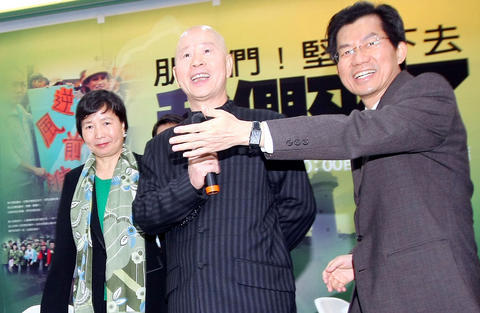Former Democratic Progressive Party (DPP) chairman Hsu Hsin-liang (許信良) paid a visit yesterday to DPP presidential candidate Frank Hsieh's (謝長廷) campaign headquarters to show his support before Hsieh was set to appear in the first televised debate with his Chinese National Party (KMT) rival Ma Ying-jeou (馬英九).
Hsu's endorsement of Hsieh was as an apparent move away from the pan-blue camp, with which he had been closely associated in the past few years, particularly during the campaign against President Chen Shui-bian (陳水扁) initiated by former DPP chairman Shih Ming-teh (施明德) in August 2006.
Hsu praised Hsieh's long-term fight in the name of democracy and urged Taiwanese not to allow the KMT to holf a monopoly over politics in Taiwan.

PHOTO: CNA
Hsieh is among the few in the pan-green camp to have espoused rational and practical cross-strait policies, Hsu said, adding that Hsieh's voice as an executive leader would be more powerful than Ma's.
Hsu said he had always liked Hsieh's take on China-Taiwan relations and that while Hsieh and Ma's views on the matter did not differ much, Hsieh's experience as a civil rights activist made him a more competent candidate for democracy than Ma, whose experience Hsu said comes not from practice but from education.
Asked to comment on allegations that Hsieh had served as a informant for the KMT government, Hsu said his own experience of being misunderstood throughout his political life made him empathize with Hsieh.

Taiwan is stepping up plans to create self-sufficient supply chains for combat drones and increase foreign orders from the US to counter China’s numerical superiority, a defense official said on Saturday. Commenting on condition of anonymity, the official said the nation’s armed forces are in agreement with US Admiral Samuel Paparo’s assessment that Taiwan’s military must be prepared to turn the nation’s waters into a “hellscape” for the Chinese People’s Liberation Army (PLA). Paparo, the commander of the US Indo-Pacific Command, reiterated the concept during a Congressional hearing in Washington on Wednesday. He first coined the term in a security conference last

Prosecutors today declined to say who was questioned regarding alleged forgery on petitions to recall Democratic Progressive Party (DPP) legislators, after Chinese-language media earlier reported that members of the Chinese Nationalist Party (KMT) Youth League were brought in for questioning. The Ministry of Justice Investigation Bureau confirmed that two people had been questioned, but did not disclose any further information about the ongoing investigation. KMT Youth League members Lee Hsiao-liang (李孝亮) and Liu Szu-yin (劉思吟) — who are leading the effort to recall DPP caucus chief executive Rosalia Wu (吳思瑤) and Legislator Wu Pei-yi (吳沛憶) — both posted on Facebook saying: “I

Sung Chien-liang (宋建樑), who led efforts to recall Democratic Progressive Party (DPP) Legislator Lee Kun-cheng (李坤城), was released on bail of NT$80,000 today amid outcry over his decision to wear a Nazi armband to questioning the night before. Sung arrived at the New Taipei District Prosecutors’ Office for questioning in a recall petition forgery case last night wearing a red armband bearing a swastika, carrying a copy of Adolf Hitler’s Mein Kampf and giving a Nazi salute. Sung left the building at 1:15am without the armband and covering the book with his coat. Lee said today that this is a serious

Firefighters are working to put out a fire on Taipei’s Yangmingshan (陽明山) reported earlier this morning. The cause of the fire is still under investigation. The Taipei Fire Department said it received a report of a fire at Xiaoyoukeng (小油坑) at 11:17am, dispatching four command vehicles, 16 firetrucks, one ambulance and 72 personnel. The fire is still burning on about 250m² of land, according to initial estimates, as eyewitnesses reported seeing smoke rising from the mountain. The Yangmingshan National Park Headquarters on Facebook said the Qixingshan (七星山) hiking trail starting from Xiaoyoukeng and the Xiaoyoukeng parking lot are closed as firefighters work to put